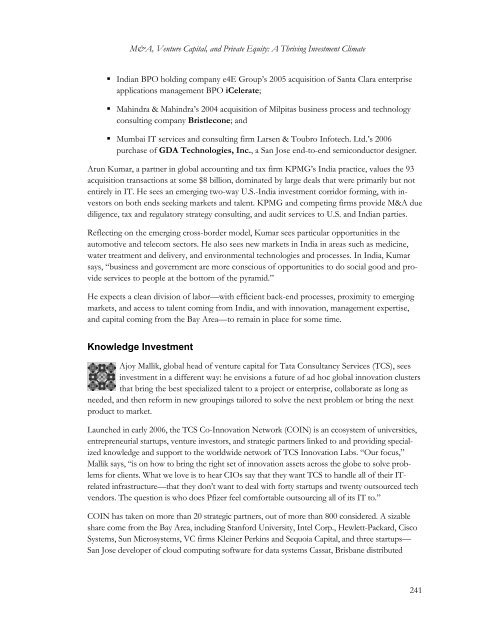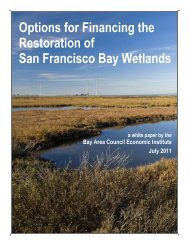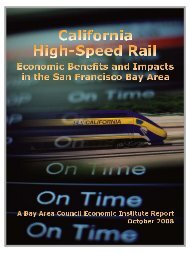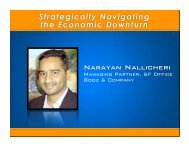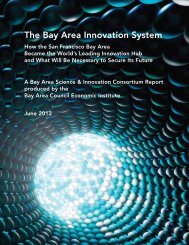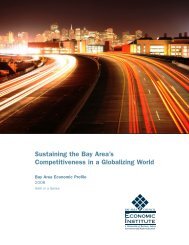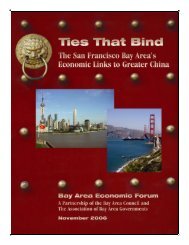PDF: 2962 pages, 5.2 MB - Bay Area Council Economic Institute
PDF: 2962 pages, 5.2 MB - Bay Area Council Economic Institute
PDF: 2962 pages, 5.2 MB - Bay Area Council Economic Institute
Create successful ePaper yourself
Turn your PDF publications into a flip-book with our unique Google optimized e-Paper software.
M&A, Venture Capital, and Private Equity: A Thriving Investment Climate<br />
• Indian BPO holding company e4E Group’s 2005 acquisition of Santa Clara enterprise<br />
applications management BPO iCelerate;<br />
• Mahindra & Mahindra’s 2004 acquisition of Milpitas business process and technology<br />
consulting company Bristlecone; and<br />
• Mumbai IT services and consulting firm Larsen & Toubro Infotech. Ltd.’s 2006<br />
purchase of GDA Technologies, Inc., a San Jose end-to-end semiconductor designer.<br />
Arun Kumar, a partner in global accounting and tax firm KPMG’s India practice, values the 93<br />
acquisition transactions at some $8 billion, dominated by large deals that were primarily but not<br />
entirely in IT. He sees an emerging two-way U.S.-India investment corridor forming, with investors<br />
on both ends seeking markets and talent. KPMG and competing firms provide M&A due<br />
diligence, tax and regulatory strategy consulting, and audit services to U.S. and Indian parties.<br />
Reflecting on the emerging cross-border model, Kumar sees particular opportunities in the<br />
automotive and telecom sectors. He also sees new markets in India in areas such as medicine,<br />
water treatment and delivery, and environmental technologies and processes. In India, Kumar<br />
says, “business and government are more conscious of opportunities to do social good and provide<br />
services to people at the bottom of the pyramid.”<br />
He expects a clean division of labor—with efficient back-end processes, proximity to emerging<br />
markets, and access to talent coming from India, and with innovation, management expertise,<br />
and capital coming from the <strong>Bay</strong> <strong>Area</strong>—to remain in place for some time.<br />
Knowledge Investment<br />
Ajoy Mallik, global head of venture capital for Tata Consultancy Services (TCS), sees<br />
investment in a different way: he envisions a future of ad hoc global innovation clusters<br />
that bring the best specialized talent to a project or enterprise, collaborate as long as<br />
needed, and then reform in new groupings tailored to solve the next problem or bring the next<br />
product to market.<br />
Launched in early 2006, the TCS Co-Innovation Network (COIN) is an ecosystem of universities,<br />
entrepreneurial startups, venture investors, and strategic partners linked to and providing specialized<br />
knowledge and support to the worldwide network of TCS Innovation Labs. “Our focus,”<br />
Mallik says, “is on how to bring the right set of innovation assets across the globe to solve problems<br />
for clients. What we love is to hear CIOs say that they want TCS to handle all of their ITrelated<br />
infrastructure—that they don’t want to deal with forty startups and twenty outsourced tech<br />
vendors. The question is who does Pfizer feel comfortable outsourcing all of its IT to.”<br />
COIN has taken on more than 20 strategic partners, out of more than 800 considered. A sizable<br />
share come from the <strong>Bay</strong> <strong>Area</strong>, including Stanford University, Intel Corp., Hewlett-Packard, Cisco<br />
Systems, Sun Microsystems, VC firms Kleiner Perkins and Sequoia Capital, and three startups—<br />
San Jose developer of cloud computing software for data systems Cassat, Brisbane distributed<br />
241


